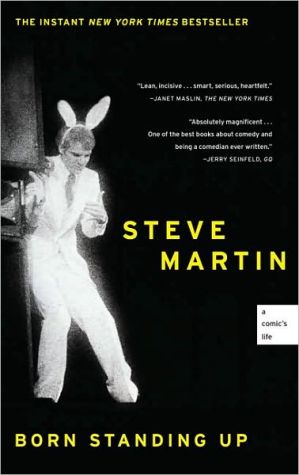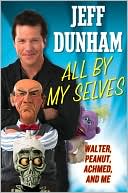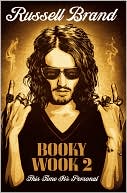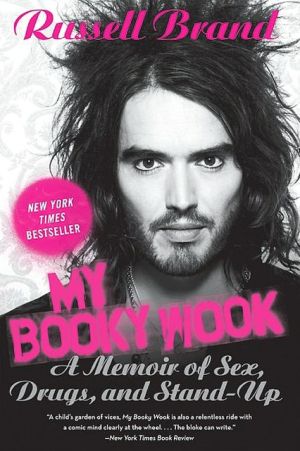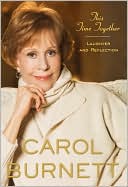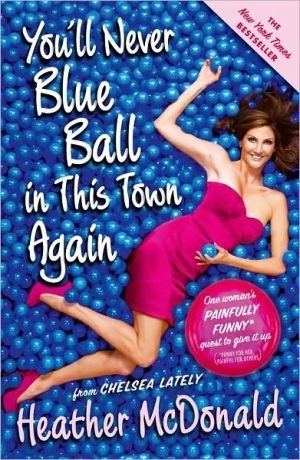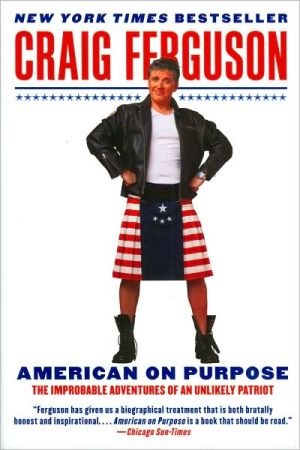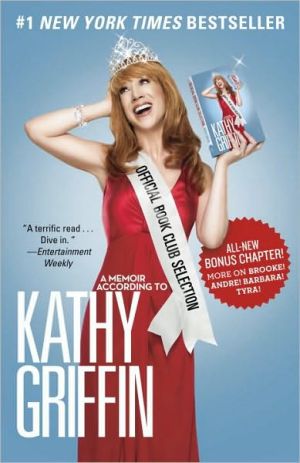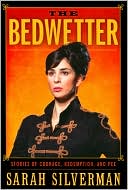Born Standing Up: A Comic's Life
In the midseventies, Steve Martin exploded onto the comedy scene. By 1978 he was the biggest concert draw in the history of stand-up. In 1981 he quit forever. This book is, in his own words, the story of "why I did stand-up and why I walked away."\ Emmy and Grammy Award winner, author of the acclaimed New York Times bestsellers Shopgirl and The Pleasure of My Company, and a regular contributor to The New Yorker, Martin has always been awriter. His memoir of his years in stand-up is candid,...
Search in google:
At age 10, Steve Martin got a job selling guidebooks at the newly opened Disneyland. In the decade that followed, he worked in Disney's magic shop, print shop, and theater, and developed his own magic/comedy act. By age 20, studying poetry and philosophy on the side, he was performing a dozen times a week, most often at the Disney rival, Knott's Berry Farm. Obsession is a substitute for talent, he has said, and Steve Martin's focus and daring his sheer tenacity are truly stunning. He writes about making the very tough decision to sacrifice everything not original in his act, and about lucking into a job writing for The Smothers Brothers Show. He writes about mentors, girlfriends, his complex relationship with his parents and sister, and about some of his great peers in comedy Dan Aykroyd, Lorne Michaels, Carl Reiner, Johnny Carson. He writes about fear, anxiety and loneliness. And he writes about how he figured out what worked on stage. This book is a memoir, but it is also an illuminating guidebook to stand up from one of our two or three greatest comedians. Though Martin is reticent about his personal life, he is also stunningly deft, and manages to give readers a feeling of intimacy and candor. Illustrated throughout with black-and-white photographs collected by Martin, this book is instantly compelling visually and a spectacularly good read. Here are some "deleted bits" that you won't find in Steve Martin's Born Standing Up, "one of the best books about comedy and being a comedian ever written" (Jerry Seinfeld). "Deleted Bits" 1) At age twelve, my sex education was non-existent, thanks to a restrained media and an embarrassed father, who once said to me in an uncomfortable heart-to-heart talk when I graduated high school, "I never taught you about sex because you learn that in the schoolyard." Once I commented to a co-worker about the strange fat women who occasionally came through the turnstiles. "They're pregnant," said my amazed friend. 2) In January of 1974, I met Mimi Farina, the sparrow-voiced folk artist and sister to Joan Baez, at a small club called the "Egress" in Vancouver, where we worked together for several nights. She had a delectable sense of humor and loved to laugh. One afternoon we bantered back and forth as we strolled along the Vancouver waterfront. It's impossible to reconstruct how she arrived at this line, but I always remembered it: "Are those glass fishnet balls in your pocket or are you just happy to see me?" She said it with the glee of someone who knew she had landed on the perfect last joke of a series, and we went into a laughing fit. After I became successful, Mimi, an activist herself, chastised me for not being more visible politically. I felt defensive as I had already delivered anti-Vietnam war rhetoric as a writer on the Smothers Brothers Comedy Hour. I'm not sure I adequately explained to her my reasons for withdrawal from activism, but I can try now. I love comedy. To work, comedy needs to be perfect, clear and focused. A dropped cocktail glass on your punch line can kill the laugh. When I perform I want the audience thinking about only one thing, what is going on at that exact moment. A public political position, especially a strident one, can be like a dropped cocktail glass. I desire to be active privately and not publicly. But more importantly, I am not an authority. When I am asked on television about a topical issue, I feel unqualified to comment. They should ask someone who knows about the issue, not a comedian who's promoting a movie. 3) Letter to Mitzi Trumbo, influenced by logic class: There exists in Pasadena a cafeteria such that it either has good food or it is full of young people; it is not full of young people. If there exist in Pasadena a cafeteria such that it has good food and is close to the Ice house, then we shall eat there or we shall eat at the ice house. We shall not eat at the Ice House and the cafeteria is close; if we eat at the cafeteria that has good food, is close to the Ice House and it is not the case that it is full of young people, we shall leave hour earlier. [three triangular dots] we shall leave hour earlier. The Barnes & Noble Review It's hard to imagine any well-known comedian alive today achieving Steve Martin status. He is an actor, comic, playwright, novelist, screenwriter, director, essayist, magician, musician, and composer; he is master of the catchphrase and the balloon animal; he is sufficiently beloved and respected that no one really holds Bringing Down the House against him. Seriously, who else is there? Adam Sandler and Will Ferrell, say, have the Saturday Night Live credits and the screen time, but we're not about to see their essays in The New Yorker. Denis Leary has the writing and serious-actor chops, but show me one parent who will let their kids memorize his albums word-for-word like we did with the mega-selling A Wild and Crazy Guy. (Twenty-nine years later, I can still recite "Cat Handcuffs.") Jon Stewart and Stephen Colbert are without peer, but their personas don't fill arenas. (Also, no banjo. Or rope tricks.) Robin Williams: similar antic quality, but too many demons (including, but not limited to, Patch Adams). Jim Carrey: what happened? Seinfeld? Feh.
\ Janet MaslinBorn Standing Up does a sharp-witted job of breaking down the step-by-step process that brought him from Disneyland, where he spent his version of a Dickensian childhood as a schoolboy employee, to both the pinnacle of stardom and the brink of disaster…Even for readers already familiar with Mr. Martin's solemn side, Born Standing Up is a surprising book: smart, serious, heartfelt and confessional without being maudlin. Decades after the fact he looks back at a period of invention and innovation, marveling at the thought that his efforts might have led absolutely nowhere if they had not wildly succeeded.\ —The New York Times\ \ \ \ \ Publishers WeeklyNeatly combining his personal and professional worlds, beloved comedian, filmmaker, author, magician and banjoist Martin (Pure Drivel) chronicles his life as a gifted young comedian in this evocative, heartfelt memoir, which proves less wild and crazy than wise and considerate-though no less funny for it. The typically reticent performer shares rarely disclosed memories of childhood-his father, a failed actor, harbored increasing anger toward his son through the years-and the anxiety attacks that plagued him for some two decades, along with his early success as a television comedy writer, first for The Smothers Brothers Comedy Hour, and the evolution of his stand-up routine. Sharp insight accompanies stories of his first adult gig (at an empty San Francisco coffeehouse), his pioneering "no punch lines" style ("My goal was to make the audience laugh but leave them unable to describe what it was that had made them laugh"), appearances on programs like The Steve Allen Comedy Hourand breakthrough moments with small, confused audiences. Though the book is vivid and entertaining throughout, Martin doesn't dish any behind-the-scenes dirt from Saturday Night Liveor The Tonight Show; rather, he's warm and generous toward everyone in his life, including girlfriends and colleagues. Tellingly, this intimate early career recap ends not with Martin's decision to give up live performance or his first starring role in The Jerk, but with a visit to his parents and Knott's Berry Farm, where he first performed as a teenager. (Nov.)\ Copyright 2007 Reed Business Information\ \ \ Library JournalIn analyzing the development of his stand-up comedy career, Martin considers to have written a biography of someone he used to know. With a preteen passion of becoming a master magician, he escaped domestic turmoil by working at a magic shop in Disneyland. Once he gained confidence in performing live, his eclectic brand of humor was honed at coffee clubs and in local theater productions. Along the way, Martin studied philosophy, which allowed him to observe comedy as social commentary. Within a few years, he stumbled into television writing, working for the controversial Smothers Brothers Comedy Hour. He was a regular guest on the Tonight Show, but it was his exposure on Saturday Night Livethat catapulted Martin to success. In the early 1980s, he decided to leave stand-up comedy and become the film star we know today. Martin has always taken his life and the art of comedy seriously; his wonderful catchphrases (e.g., "Excuuuuse me"; "I'm a wild and crazy guy") will live on forever in our vocabulary. An intelligent biographical assessment recommended for all libraries. [See Prepub Alert, LJ8/07.]\ —Richard A. Dickey\ \ \ \ \ \ Kirkus ReviewsA charming memoir tracking what the great comic characterizes as his "war years."Despite gaining renown as one of Saturday Night Live's "wild and crazy guys," Martin (The Pleasure of My Company: A Novella, 2004, etc.) didn't set out in search of celebrity. From his boyhood forays onstage in the '50s through the late '70s, when he somewhat unwittingly became a huge star, he sought, above all, comic originality. Foregoing the common compromise made by young comedians that trades fresh and authentic hilarity for fame, Martin became famous on his own terms. During one period of his stand-up career, he purposefully developed an act entirely devoid of jokes, and he always approached his material with dedication and diligence. Martin offers an eloquent and exacting account of his fumbling early shticks, illuminating the type of humor, and humorists, that interested him the most. He set an unspoken deadline for himself-age 30-by which to have found success or to throw in the towel, but then abandoned it as that age came and went and he was still toiling on the road. After gigs on television shows like The Smothers Brothers and The Tonight Show, Martin's popularity steadily increased. Some of the funniest material here is delivered in an offhand manner, often in the form of photo captions or narrative asides. Martin also offers an emotional-but not overly nostalgic-account of his relationship with his father, who was a distant and disapproving figure until the end of his life, when he and his son reconciled. In all of his relationships, whether familial or romantic, Martin approaches his subjects with generosity, warmth and integrity. Heartfelt and very, very funny.\ \ \ \ \ The Barnes & Noble ReviewIt's hard to imagine any well-known comedian alive today achieving Steve Martin status. He is an actor, comic, playwright, novelist, screenwriter, director, essayist, magician, musician, and composer; he is master of the catchphrase and the balloon animal; he is sufficiently beloved and respected that no one really holds Bringing Down the House against him. Seriously, who else is there? Adam Sandler and Will Ferrell, say, have the Saturday Night Live credits and the screen time, but we're not about to see their essays in The New Yorker. Denis Leary has the writing and serious-actor chops, but show me one parent who will let their kids memorize his albums word-for-word like we did with the mega-selling A Wild and Crazy Guy. (Twenty-nine years later, I can still recite "Cat Handcuffs.") Jon Stewart and Stephen Colbert are without peer, but their personas don't fill arenas. (Also, no banjo. Or rope tricks.) Robin Williams: similar antic quality, but too many demons (including, but not limited to, Patch Adams). Jim Carrey: what happened? Seinfeld? Feh. \ So how did Steve Martin achieve Steve Martin status? The answers can be found in the performer's autobiography, Born Standing Up: A Comic's Life. "I was seeking comic originality, and fame fell on me as a by-product," Martin writes without false modesty, adding elsewhere that "despite a lack of natural ability, I did have the one element necessary to all early creativity: na?veté, that fabulous quality that keeps you from knowing just how unsuited you are for what you are about to do." His volume itself is modest as well: spare and unsentimental, gently self-effacing, a colossal success story told in just over 200 pages (including photos). This is partly because the book is not so much autobiography as autobiographical, limited almost entirely to the genesis and flowering of Martin's brainy-meets-loony stand-up career.\ In other words, if you are dying to know what it was like to work with Eddie Murphy, you are out of luck (though you will get a soupcon of Dan Aykroyd). I should also add that if you are looking for wild-and-crazy-guy tales of late nights on the road -- sex with fans, benders with Sam Kinison -- you will also be disappointed: Martin spends his between-show downtime watching The Brady Brunch and trolling antique stores for art. And if you are expecting out-loud, fall-down laughs on every page -- this is Steve Freaking Martin, after all -- you should probably read Cruel Shoes. This book, though not without funny asides and anecdotes, is actually not all that hilarious. And as it turns out, that's part of what makes it good.\ Martin's first big break came at age ten, when he landed a job selling guidebooks at Disneyland, whose opening had been announced with two-inch headlines "as though it were a victory at sea." Disneyland, he writes, was his "Versailles." It was also his earliest education. Apprenticing himself to the performers in its employ, Martin learned rope tricks, sleights of hand, sight gags, the essentials of patter. By age 15, through the kindness of the local Kiwanis, he was performing "at the hectic pace of one show every two to three months." He kept scrupulous notes on how each bit played -- "Quiet," "Big laugh!" "Relax, don't shake" -- and learned to juggle and play banjo, eventually landing a regular gig performing melodramas and olios with the troupe at Disney rival Knotts Berry Farm. There, he writes, the "soft, primordial core" of his act was formed.\ Then it was on to crappy clubs in San Francisco, crappy clubs in Aspen, crappy clubs in God-knows-where -- plus philosophy studies at a series of colleges -- and a stand-up routine that was anything but. "How many people have never raised their hands before?" he asked, drawing on his fascination with logic, or lack thereof; he confessed his fetish for wearing men's underwear; he developed a habit of Pied-Pipering the audience out into the street, ad-libbing all the way. After lucking into a TV job writing for the Smothers Brothers, things snowballed from there, to Carson, to Saturday Night Live, to the 45,000-seat Nassau Coliseum, sold out -- a bit too large for the Pied Piper routine. "The lightning strike," he writes," was happening to me."\ Along the way, of course, there are panic attacks, political shifts, puzzling breakups (best advice he gets: "Oh, that'll happen a lot"), and plenty insights into the really rather alien anatomy of his act. And there are lingering grudges -- resolved beautifully at the end -- against his distant and likely envious father, a failed actor turned real estate salesman who presided over silent dinners and threatened at any moment to explode into violent rage. Martin recalls, at seven or eight, the one time ever that his father suggested a game of catch: "This offer to spend time together was so rare that I was confused about what I was supposed to do," he writes. "We tossed the ball back and forth with cheerless formality." This simple, haunting image makes quite clear what prompted young Steven to, in effect, run off and join the circus.\ This image also makes Martin's scattered lapses in writing craft all the more glaring by contrast. "Having cut myself off from [my father], and by association the rest of the family, I was incurring psychological debts that would come due years later in the guise of romantic misconnections and a wrong-headed quest for solitude," Martin writes clunkily, obviously taking dictation from his therapist. Elsewhere, he's sophomoric -- "The balls were bright red, and so was I" -- or in desperate need of a line edit ("The physical distance from each other had permanently broken up Nina and me").\ But honestly, this awkwardness and unevenness are part of the book's charm. At heart, Steve Martin is a dweeb -- a handsome dweeb, but a dweeb. (Come on, he was the guy in high school who did magic!) As he has also made clear in interviews, he is not altogether comfortable talking about himself. His act was only superficially autobiographical, if ever; the genre does not come naturally to him in the first place. And yet here he is. He resists the urge to hide behind jokes, to do -- in the guise of self-disclosure -- well honed, perfectly polished material. (Perhaps he learned something from an appearance on Merv Griffin, where, when he launched into a bit -- "I just bought a new car. A '65 Greyhound bus" -- Griffin, interrupting, asked why on earth he would do that. "I had no prepared answer; I just stared at him," Martin recalls. "I thought, 'Oh my God, because it's a comedy routine.' ") In this book, however, Martin is telling the truth. Most of it, anyway. Even when, like comedy itself, it's not pretty. --Lynn Harris\ Lynn Harris is an author, essayist, commentator, and award-winning journalist. Her most recent book is the satirical novel Death by Chick Lit. A former stand-up comic, she lives in Brooklyn.\ \ \
